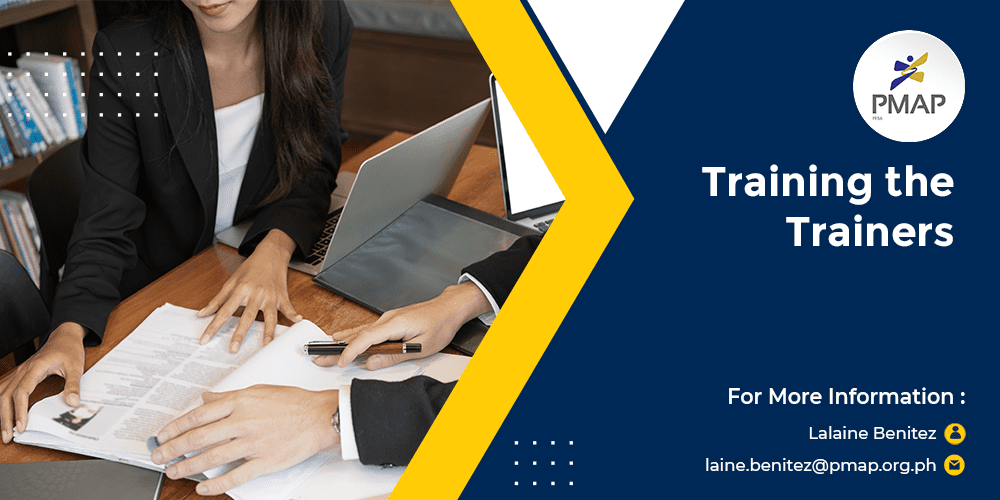Training the Trainers

Event Date:
May 13, 2024
Event Time:
9:00 am
Event Location:
PMAP Center
Fee: Php 11,500.00 – Member + 12% VAT | Php 13,500.00 + 12% VAT – Non Member
Course Description:
Prepares subject matter experts to design and implement productivity-focused training interventions. It provides tools and techniques on how to transform the smallest value in a decision-maker’s head into a productive training delivery. This model of training workshop is highly operational and useful in that it translates every training objective and instructional effort into immediate contributions to immediate needs, thus ensuring bottom-line results.
The workshop assumes that the participants have mastery of the subject matter that they are expected to train people on. It employs a highly interactive and hands-on approach and methodology. The focus of this training is on the Subject Matter Experts because they possess the knowledge, expertise, and or skills that others need or would like to learn. A training intervention is an opportunity to affect the thinking of a large group of employees, an opportunity to change things that may be affecting their respective work and the results of their work. A successful training intervention, therefore, should produce change.
The role of the Subject Matter Expert is to facilitate the greatest amount of change in as many employees as possible in the shortest time. This program has been designed to explain and guide subject matter experts through the steps most likely to create change in others. The employee-learner needs to take center stage more than on what the subject matter expert needs—because in training, the employee-learner is in the “spotlight” not the trainer. It is the employee-learner’s performance that is important.
Course Objectives:
At the completion of the workshop, the participants should be able to:
- IDENTIFY the components of a training and instructional design that yields changes in task
performance and productivity; - DESCRIBE the key steps and activities involved in designing instructional interventions;
— Organization’s mission, vision, goals, and priorities;
— Participants’ learning preferences, cognitive styles and modes of integrating information; - PREPARE a course or session trainer’s guide on a specific subject matter using the structures and guidelines taught during the workshop, including the necessary training aids and presentation materials;
- CONDUCT a learning session on a specific subject matter where they have expertise on or are meant to transfer such expertise to adult learners, not only in terms of a cognitive understanding of it, but the learners should be able to demonstrate the actual use and/or behavior on the job;
- DEMONSTRATE proficiency in the use of various appropriate media, methods, and technology
required for effective delivery of training; - UTILIZE various monitoring mechanisms on how to embed learning and ensure behavioural
change;
Workshop Flow:
I. CREATING A LEARNING ENVIRONMENT
- Opening Remarks
- Introductions
- Workshop Orientation
-
-
- — Objectives
- — Content
- — Process
-
- Personal Resource and Learning Goals
- Trainer Self-Assessment
- Profile and Competencies of an Effective Trainer
II. USING ADULT LEARNING PRINCIPLES
- Overview
- Lesson Objectives
- Differences Between Pedagogy (Child-Learning) and Andragogy (Adult-Learning)
- Adult Learning Principles
- Exercise: Applying Adult Learning Principles to Past Experiences
III. ANALYZING THE TRAINING REQUIREMENTS
- Overview
- Lesson Objectives
- Elements to Consider in Analyzing Training Requirements
- Worksheet for Analyzing the Training Requirement
- Example: Analyzing the Training Requirement
- Exercise: Using the Worksheet to Analyze the Training Requirement
IV. DEVELOPING LEARNING OBJECTIVES
- Overview
- Lesson Objective
- Taxonomy/Types of Objectives
- Steps in Developing Learning Objectives
- Exercise 1: Assessing Learning Objectives
- Exercise 2: Writing Learning Objectives
- Critique
V. OUTLINING THE TRAINING CONTENT
- Overview
- Lesson Objective
- Definition and Purpose
- Steps in Outlining the Training Content
VI. SELECTING TRAINING METHODS
- Overview
- Lesson Objective
- Definition and Purpose
- Types of Training Methods
- Criteria for Selection
VII. DEVELOPING AND USING TRAINING AIDS
- Overview
- Lesson Objective
- Definition and Types of Training Aids
- Purpose of Training Aids
VIII. DEVELOPING A TRAINING PLAN
- Overview
- Lesson Objective
- Definition and Purpose
- The ROPES Model of Developing a Training Plan
- Timing Your Lesson
- Formatting Your Training Plan
IX. PRACTICE TRAINING & FACILITATTION
- Final Preparations for The Practice Training
- Exercise: Practice Training and Critique
- USING BASIC FACILITATION SKILLS
- Types of Facilitation Skills
- Considerations in Handling Problem Situations
- Identifying Strategies for Handling Problem Situations
- More Inputs as Necessary on Training Delivery Skills
- Presentation and Platform Skills
- Dealing with Anxiety
X. EFFECTIVE TRAINING EVALUATION
- Basics of an Evaluation System
- Planning the Evaluation System
- Levels of Training Evaluation
- Strategies and Techniques
- Implementing the Evaluation System
- Integration Session
- Evaluation of Workshop
- Closing Ceremonies
Methodology:
-
-
- — The program employs various learning methodologies and techniques suitable for adult learners. Depending on the objectives and nature of a specific session, methods such as group dynamics, use of assessment instruments, group discussions, action planning, lecturettes, etc., will be utilized in a balanced and synergistic manner.
.
- — The program employs various learning methodologies and techniques suitable for adult learners. Depending on the objectives and nature of a specific session, methods such as group dynamics, use of assessment instruments, group discussions, action planning, lecturettes, etc., will be utilized in a balanced and synergistic manner.
-
Facilitator:

Mr. Robert Policarpio, FPM
2015 PMAP President and former HR of San Miguel Corporation
For other queries, you may contact Ms. Lalaine Benitez at laine.benitez@pmap.org.ph